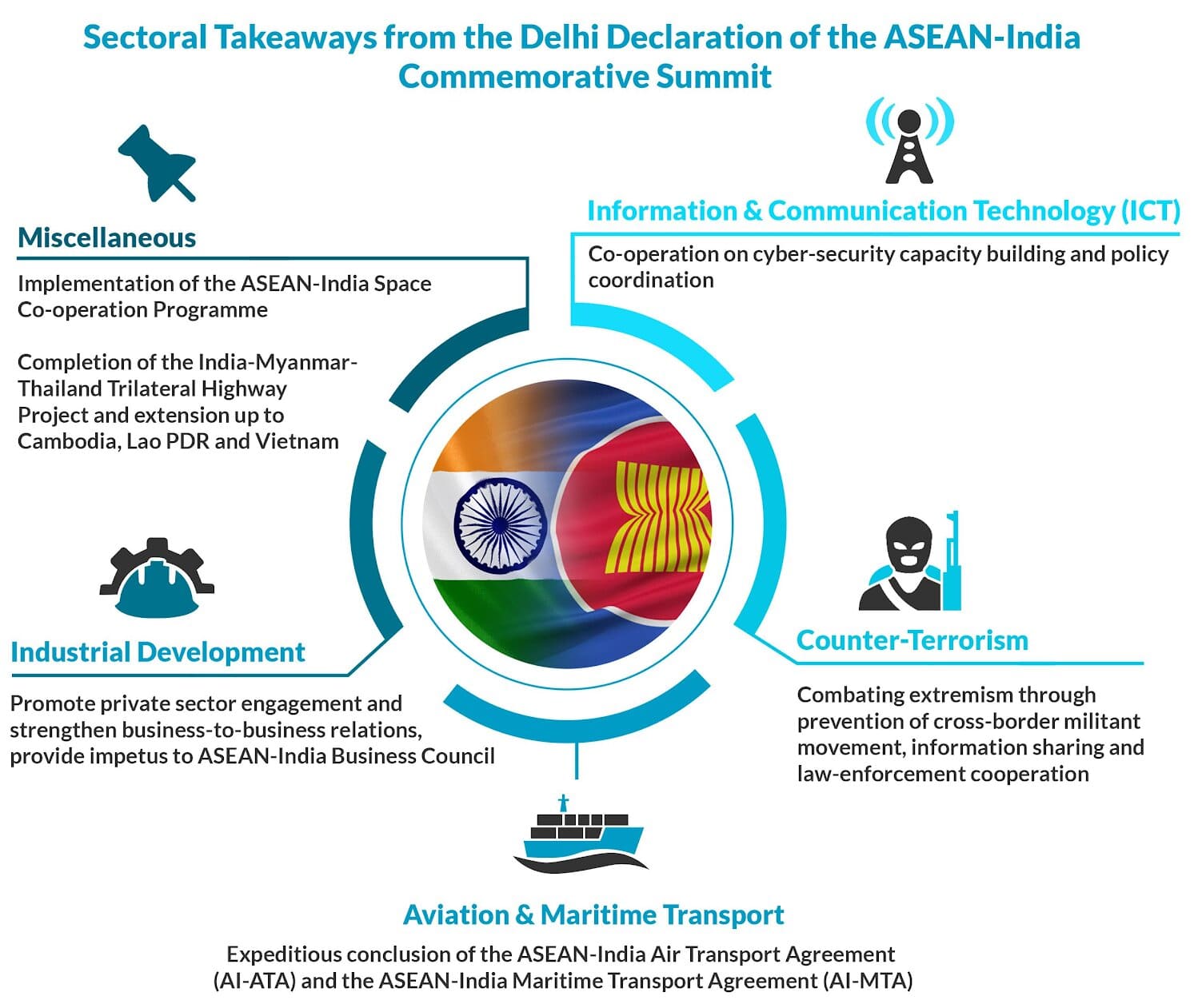International Relations
India-Vietnam Relations
- 04 Dec 2020
- 8 min read
This article is based on “India-Vietnam’s growing relations: Future prospects” which was published in The Times of India on 03/12/2020. It talks about the evolving relations between India and Vietnam.
Recently, the defence ministers of both India & Vietnam Indian held the meeting through video-conferencing. In this meeting, both sides committed to work on a new joint vision statement for better future prospects.
India sees Vietnam as a trustworthy friendly foreign country with shared strategic concerns and common interests. Both countries are collaborating in multiple domains like defence cooperation, trade and geopolitical sphere.
Apart from this, both countries share common values like multilateralism based on equality, respect for territorial integrity and sovereignty of all nations, respect for international law and order.
These overwhelming convergence on international and regional issues between the two nations makes the future prospects for deepening the relations between the two countries very bright.
Background
- While defence cooperation has been one of the most significant pillars of the Comprehensive Strategic Partnership initiated by the two countries in 2016, the relationship between the two countries was established much earlier.
- India had established the Consul General’s office in Hanoi as early as 1956.
- Vietnam established its diplomatic mission in 1972. India had stood by Vietnam in opposing US intervention in that country at the cost of embittering Indo-US relations.
- The relationship was further strengthened when India, in the early 1990s, initiated its “Look East Policy” with the specific objective of economic integration and political cooperation with Southeast Asia and East Asia.
Areas of Cooperation
- Strategic Partnership: India and Vietnam agreed to strengthen their strategic partnership “in line with India’s Indo-Pacific Oceans Initiative (IPOI) and the ASEAN’s Outlook on Indo-Pacific to achieve shared security, prosperity and growth for all in the region.”
Note:
- IPOI is an initiative launched by Prime Minister Narendra Modi at the East Asia Summit in Thailand in November 2019.
- The initiative is centred around seven pillars including maritime security; maritime ecology; maritime resources; capacity building and resource sharing; disaster risk reduction and management; science, technology, and academic cooperation; and trade connectivity and maritime transport.
- India has called on Vietnam to partner on one of the seven pillars of the IPOI.
- Economic Cooperation: Trade and economic relations for mutual benefit, which have significantly improved over the years particularly after the ASEAN- India Free Trade Agreement was signed.
- India realises that Vietnam is a potential regional power in South East Asia with great political stability and substantial economic growth.
- Even more impressive is its growth which is driven by a record trade surplus, despite the collapse in global trade. The growing middle class also assures a stable market.
- Vietnam is also keen for India to expand its presence in oil and gas exploration in the South China Sea and has firmly maintained that the areas fall well within Vietnam’s economic zone.
- India is investing in development and capacity assistance for Vietnam through quick impact projects (QIP), proposals in the area of water resource management in Vietnam’s Mekong Delta region, Sustainable Development Goals (SDGs), and digital connectivity.
- Defence Cooperation: While Vietnam is interested in modernising its armed forces, India is interested in developing defence capabilities of its South-East Asian partners sufficiently to maintain peace in the strategic region.
- Vietnam is interested in India’s Akash surface-to-air systems and Dhruv advanced light helicopters and Brahmos missiles.
- Apart from this, the defence relations include capacity building, dealing with common security concerns, training of personnel, and cooperation in defence R&D.
- China Factor: China factor also weighs heavily in the respective strategic calculus of India and Vietnam.
- Both countries had fought wars with China and both have border problems with that country. China aggressively continues to encroach in the territories of the two countries.
- Hence, it is natural for both the countries to come closer with a view to restrain China from its aggressive actions.
Way Forward
- Coordinating at Global Level: Keeping in mind the strategic challenges in the Indo-Pacific region, primarily those posed by China, India and Vietnam should work in close coordination at multilateral institutions such as the U.N. Security Council, where both India and Vietnam are elected to be non-permanent members in 2021.
- Coordinating At Economic Front: Both Countries need to leverage the economic opportunities available because of anti-China sentiments and several manufacturing firms deciding to shift from China.
- However, India should figure out a strategy, so that India’s stance of not joining RCEP should not become a barrier in the growth of trade between the two countries.
- Moreover, India can learn from Vietnam’s open trade policy, due to which Vietnam’s exports have grown by about 240% in the past eight years.
- Coordinating With Other Regional Partners: Vietnam’s leadership of ASEAN may make it easier for India and ASEAN to cooperate more on regional security issues.
- Some of the big powers within ASEAN like Indonesia are also likely to take stronger positions against China given its aggressive posture in the South China sea.
- Building Deeper Relations: Both Countries should expedite the process of negotiations for finalisation of defence deals.
- This assumes more importance for India after the Galwan valley Clash & China’s disrespecting international law including the 1982 UN Convention on the Law of the Sea.
Conclusion
In the recent meeting, the two countries indicated that they are now looking for a joint vision statement next year. This suggests that both sides are committed to further deepen the relationship.
|
Drishti Mains Question The overwhelming convergence on international and regional issues between India and Vietnam makes the future prospects for deepening ties. Comment. |
This editorial is based on “Choppy tidings: On higher GST inflows” which was published in The Hindu on December 3rd, 2020. Now watch this on our Youtube channel.







